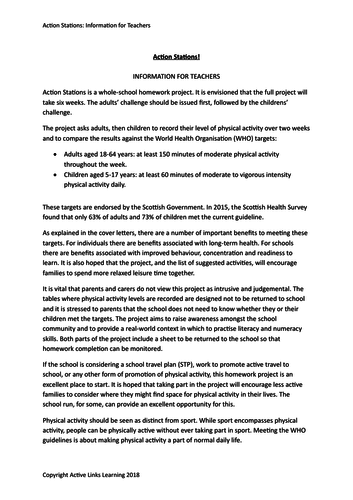







Action Stations is a six-week, whole-school homework project. It aims to raise awareness amongst pupils and their families, of their own levels of physical activity, the World Health Organisation (WHO) guidelines and the health implications of a lack of physical activity. Action Stations also develops numeracy skills with the completion of tables and literacy skills through a written element to the homework.
The project asks children to record an adult in their family's physical activity levels for two weeks, and to compare their findings with the WHO's recommendations. Following this, they then record their own levels of physical activity for two weeks. Again, the children are asked to compare their findings against the WHO recommendations.
It is vital that parents and carers do not view this project as intrusive and judgemental. The tables where physical activity levels are recorded are designed not to be returned to school and it is stressed to parents that the school does not need to know whether they or their children met the targets. The project aims to raise awareness amongst the school community and to provide a real-world context in which to practise literacy and numeracy skills. Both parts of the project include a sheet to be returned to the school so that homework completion can be monitored.
If the school is considering a school travel plan (STP), work to promote active travel to school, or any other form of promotion of physical activity, this homework project is an excellent place to start. It is hoped that taking part in the project will encourage less active families to consider where they might find space for physical activity in their lives. The school run, for some, can provide an excellent opportunity for this.
Physical activity should be seen as distinct from sport. While sport encompasses physical activity, people can be physically active without ever taking part in sport. Meeting the WHO guidelines is about making physical activity a part of normal daily life.
The project asks children to record an adult in their family's physical activity levels for two weeks, and to compare their findings with the WHO's recommendations. Following this, they then record their own levels of physical activity for two weeks. Again, the children are asked to compare their findings against the WHO recommendations.
It is vital that parents and carers do not view this project as intrusive and judgemental. The tables where physical activity levels are recorded are designed not to be returned to school and it is stressed to parents that the school does not need to know whether they or their children met the targets. The project aims to raise awareness amongst the school community and to provide a real-world context in which to practise literacy and numeracy skills. Both parts of the project include a sheet to be returned to the school so that homework completion can be monitored.
If the school is considering a school travel plan (STP), work to promote active travel to school, or any other form of promotion of physical activity, this homework project is an excellent place to start. It is hoped that taking part in the project will encourage less active families to consider where they might find space for physical activity in their lives. The school run, for some, can provide an excellent opportunity for this.
Physical activity should be seen as distinct from sport. While sport encompasses physical activity, people can be physically active without ever taking part in sport. Meeting the WHO guidelines is about making physical activity a part of normal daily life.
Something went wrong, please try again later.
This resource hasn't been reviewed yet
To ensure quality for our reviews, only customers who have purchased this resource can review it
Report this resourceto let us know if it violates our terms and conditions.
Our customer service team will review your report and will be in touch.
$11.38
